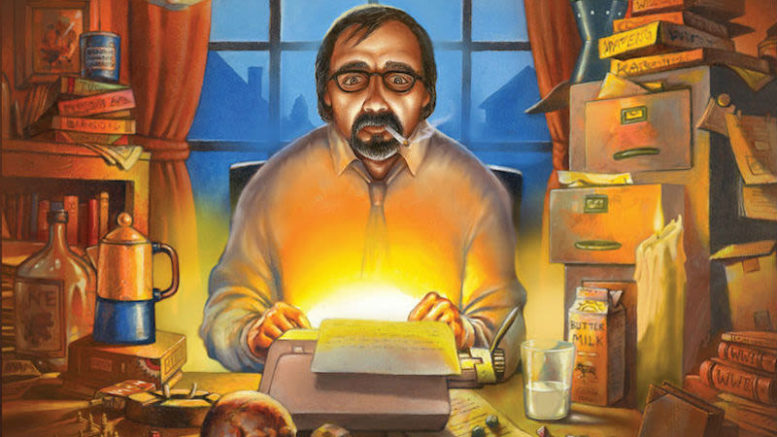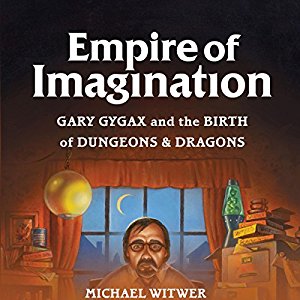The Drider made short work of the adventuring party…The noble half-elf Paladin, Aelar, bravely faced the cursed drow but fell. Moving quickly the half Drow half spider targeted the Dragonborn fighter, Jesliann. Fight as hard as she may she too fell to the Drider’s blade.
Rabbit, the Gnome Monk, charged the beast hoping to stop it but he succumbed to the flurry of strikes from the Drider’s longsword. Cursing the foul beast, Gremar, the Dwarven cleric, unleashed divine magic but was trampled under eight spider legs.
Only two remained standing. Krakxel the human assassin and Belrog the tiefling sorcerer. The party had managed to inflict serious damage to the Drider. Black icor oozed from several deep wounds. Not to mention the several large spiders whose corpses now littered the dungeon hallway.
Knowing the spell caster needed room Krakxel charged. He hoped to buy Belrog time to finish off the spider cursed fiend. Fight as he might a well placed strike by the Drow dropped the assassin.
Seeing only the lone spellcaster was left the Drider glared. It would feed well tonight. The skittering of its eight legs echoed in the hall.
Belrog had one chance. With a force of will, a gesture and arcane phrase a bolt of magic energy shot out towards the monster…
That was the scene in a recent Dungeons & Dragons 5th Edition game I am running. The tension and suspense around the table was pallitable. Each player desperately tried to stop the rampaging Drider while fending off several other monsters. It’s one of “those” gaming stories you never forget.
Which brings me to a book I recently read titled Empire of Imagination by Michael Witwer. It may be hard to believe but there was a time, not that long ago, when there was no Dungeons & Dragons. In fact there were no role playing games (RPGs). Tabletop war games focused on reliving historical battles, not storytelling.
Fast forward fifty years and Gen Con 50 was recently held in Indianapolis in August 2017. I had the pleasure to attend along with 207,000 other game enthusiasts! We owe this all to the hard work of many people but one name in particular stands out among them: Gary Gygax.
For those of you who don’t know Gary Gygax was the creator of the original Dungeons & Dragons game. In Empire of Imagination Michael Witwer retells Gary’s life story and how it lead to the most popular RPG of all time.
Before getting into the details this book dealt with a lot of the issues start up businesses have to overcome. It’s not a history of role playing, at least not directly. It’s the story of Gary Gygax and the founding of TSR and how the game was created. I found it to be a surprisingly emotional story. For what is, at it’s heart, an entertainment company the road to bring D&D about was not all fun and games. There were serious and bitter disputes. A lot of pain and suffering went into getting D&D published.
Gary Gygax grew up in Lake Geneva, Wisconsin. His childhood influenced his future in special ways. He grew up listening to his father tell fantastical stories sparking a desire for adventure. Gary played games like chess with his grandfather and developed a mind for strategy. There were even a few unexplained, supernatural experiences along the way.
In a time before the Internet, social media, and video games he consumed pulp fiction novels and comic books. Reading these stories of space heroes and barbarians further set the ground work for an idea that would change gaming.
Gary’s first gaming experience didn’t deal with fantasy or science-fiction. Early on he moved from chess to tabletop wargames spending countless hours reinacting historical battles. He became so immersed in accurately recreating these settings that he built a sand filled table to play on. That table would follow Gary over the years and eventually became one of his prized possessions.
Michael Witwer blends the past with the “present” in the book. The early events of Gary’s life are woven in with challenges of starting TSR. Without benefits of email or social media conventions and magazines are the only way to spread word of new games or ideas.
Chainmail, the tabletop simulation of fantasy battles, becomes a cornerstone of a new annual gaming convention, Gen Con. Previously wargames dealt solely with historical battles. The concept of recreating the mystical battles in books like the Lord of the Rings or Conan the Barbarian was never considered. Chainmail introduced players to the world of elves, orcs, and dwarves. It was still a war game but it opened a door into another world.
The turning point came with the concept of replacing units of troops with individual heroes. You no longer controlled dozens or hundreds of units. You played a single hero but the rules remained the same. To add flavor to their units players began to imagine what these heroes would look and sound like. The early attempts at roleplaying were created.
Gary had an idea for a new kind of game. He got down to drafting the rules for this new way to play tabletop games. Players would take on the persona of a fantasy character and decide what actions to make. Traditionally you chose between moving or attacking each turn. This new game system provided complete freedom to players to chose what they wanted to do.
Developing a completely new technique of play from scratch required many hours of playtesting. Playtesting of course required players. Seeing its potential Gary had concerns about the new game being copied and did most of the playtesting with close friends and his children. This introduction to roleplaying gave the new game its name. Gary’s daughter was the one who, upon hearing it in a list of potential names, said Dungeons & Dragons should be the title of the new game.
Gary Gygax had a great idea but there was still a big problem. He knew Dungeons & Dragons could be a huge success but he lacked the funds to produce and distribute the game. With little choice he brought on a business partner. That decision would impact not only Gary’s life but also the life of Dungeons & Dragons.
A typical D&D game is a fictional adventure through exotic landscapes and eery dungeons. The real life successes and failures of Gary and TSR read as almost too extravagant to be true. It’s a journey that stretches from Lake Geneva, Wisconsin to wild parties in Hollywood, California. There would be challenges from religious controversy to boardroom power plays. Several times the fate of the game would come down to figurative rolls of the dice.
If you have an interest in business and the struggles of a start up you will enjoy Empire of Imagination. This a book about a business but it isn’t a business book. If you just want to know more about the man who changed the world of tabletop gaming forever this book is for you too.
Reading how D&D came to be the global phenomena it is today was as exciting as any action in the Forgotten Realms. It’s hard to believe there as a time when there was doubt about the game’s potential. Several companies originally turned down publishing it. Today we’re seeing Dungeons and Dragons move into mainstream media. Where once the exploits of one’s favorite character was isolated to small groups you can watch entire game sessions online in realtime now.
Gary Gygax was a creator. He had an idea in his heart that needed to get out. It was no easy task and he faced may personal and public setbacks. But if he hadn’t endured we wouldn’t be playing the game he gave us today.
I recommend Empire of Imagination to any fan of tabletop roleplaying games. The story is an adventure in its own right and one I think you will enjoy. Michael Witwer even weaves a fantasy story into the narrative which I thought was a nice touch.
Michael Witwer researched the events and while some things may be debatable, depending on which side you ask, it is a story as thrilling as the game it created. An index of all of the source material is provided so you can verify the accuracy of the book.
I look forward to your feedback and your thoughts on Empire of Imagination in the comments below.
Oh, let us not forget our intrepid adventurers. That encounter came down to a die roll, literally. Belrog was down to 2 hit points. As fate would have it Belrog had initiative. With the whole gaming group focused on Belrog I broke character and leveled with him. I told him how it stood. The Drider had a single hit point but multiple long sword attacks. If Belrog missed his next attack I was confident my Drider would be victorious.
I let that hang in the air for a moment and then told him to roll his attack. He tossed the twenty sided die on the table. Fate again favored our sorcerer that night. He hit.
The badly wounded Belrog stood victorious over the dreaded Drider. Cheers erupted around the table and an unforgettable gaming memory was created.
Without Gary’s work and dedication, that memory, and many others, wouldn’t have happened. For this I will be eternally grateful to him.
Game on everyone,
Oliver Greytome


As always Greytome such a good review 🙂 It’s also good to know that even the B+ team has epic hereos! 😉
I’ll be sure to tell them they have graduated from the B Team to the B+ Team! 😜